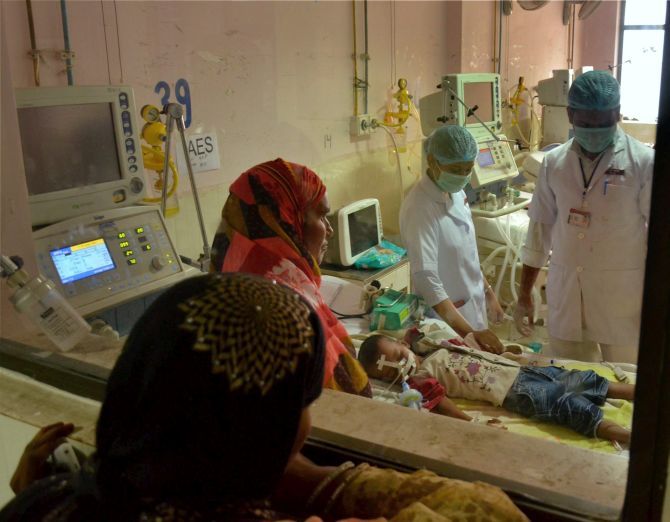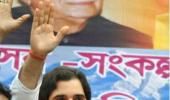'...and the government is suppressing the truth.'
Sahil Makkar reports from the BRD Medical College Hospital in Gorakhpur where 60 children have died in a week.

Gorakhpur, a little town in eastern Uttar Pradesh with a population of more than 600,000 people, came into the limelight a few months ago as Chief Minister Yogi Adityanath's Lok Sabha constituency.
Last week, it was among the most searched places online for the death of 60 children in less than a week at the biggest hospital in Gorakhpur.
While the scene of the tragedy -- the Baba Raghav Das Medical College -- is under the global scanner for negligence, the locals are still able to contain their anger though some are screaming 'murder' amid an air of suspicion all around.
As VIPs (primarily politicians from the ruling Bharatiya Janata Party as well as the Opposition) criss-cross the town at regular intervals either for damage control or mileage, while blocking arterial roads, parents and relatives of the dead children grieve, mostly unnoticed by the authorities.
While Adityanath surveyed the hospital on Sunday, August 12, it was the turn of former chief minister Akhilesh Yadav on Monday.
Zaid Khan, one of the unlucky parents, broke down at the burial site of his five-year-old daughter Kushi, who allegedly died of encephalitis on Friday, August 11 -- a day after oxygen supply snapped at the paediatric department of the BRD Medical College.
Kushi was among the 60 children who died in the past five days in the hospital.
"Kushi received oxygen for a short time. But when the supply snapped, the doctor asked us to use the ambu (self-inflating bags). She died two hours later. They say it was encephalitis," Khan recalls the night when he lost her daughter on bed number 38 of ward 12.
He witnessed the deaths of two more girls in the same ward due to lack of oxygen.
"It is murder of our children and the government is suppressing the truth," says Khan who wanted his daughter to study in an English medium school.
Now his only hope for justice lies with the media, which has been camping outside the hospital since the news of tragedy broke.
At the hospital, doctors and the state administration are trying to convince people that shortage of liquid oxygen was not the cause of death. But there is a buzz in the town, doubting the suspension of BRD medical principal Dr Rajeev Mishra and the police hunt of the gas supplier at a time when the state government is claiming the deaths are because of vector-borne diseases, especially encephalitis.
"Everything seems fishy here," says Rakesh Sinha, a 28-year-old driver from neighbouring Bettiah district in Bihar.
Sinha has been staying outside the paediatric department, part of it located on the ground floor and the remaining on the first floor of this 950-bed hospital, for the past one month for the treatment of his three-year-old son Ankush.
Sinha points at the absence of fans and non-operational centralised air-conditioning for the past one month.
"How will a patient recover in such a condition?" asks Meena Kumari, a resident of Kushi Nagar, who like Sinha has been staying outside the paediatric department for several days for treatment of his son.

The hospital looks like a run-down building with garbage strewn all across. Photograph: PTI Photo
Things have not changed despite many high-profile visits, including those from Adityanath and Union Health Minister J P Nadda.
The hospital looks like a run-down building with garbage strewn all across, despite the Swachh Bharat mantra. Poor drainage has made things worse in the rainy season.
In fact, many doctors have already taken ill because of infection.
"It is a low-lying area and is prone to many diseases. I will look into all aspects," says Dr P K Singh, the newly appointed principal of the BRD Medical College.
But neither the deaths nor the lack of facilities has stopped patients from seeking admission in the hospital. Even from neighbouring districts.
Around 50 children were admitted to the paediatric department on Friday, a day after the first news of death due to shortage of oxygen made headlines.
The paediatric department has a strength of 210 beds and it keeps around 250 to 280 children at any given point.
At the hospital, medical staff at the neonatal intensive care was found hustling from one bed to the other to arrest the rising death toll.
Dr Mahim Mittal, in charge of the medicine department, says encephalitis is endemic in this region and the months of July, August, September and October are the peak time for this vector-borne disease.
The encephalitis virus is found in pigs and dead birds from where it gets into mosquitoes and then into human beings.
The location of the BRD Medical College is such that it caters to the demand from both urban and rural areas.
About 4,500 to 5,500 patients come to the OPD (outpatient departments) daily.
The hospital also gets anywhere between 2,500 and 3,500 patients of encephalitis every year from 16 adjoining districts, including Basti, Azamgarh and Kushinagar.
"It is one of the biggest territory hospitals in the region and people only come to us when they have tried every other way to get treatment. We usually don't get much time to treat them," Dr Mittal says, referring to the high mortality rate because of encephalitis.
The last outbreak of encephalitis in Gorakhpur was reported in 2005, when around 1,000 people died.
Back at the hospital, a high-level team probing the incident is busy collecting documents on deaths over the years, expenditure and various tenders floated by the medical college.
"I am thinking of transferring all staff of the medical college because they are not giving us the relevant files for investigation," says a visibly upset K K Gupta, director general medical education of Uttar Pradesh, hinting at rampant corruption.











